Analysing Culture, Politics, and Power Dynamics in Tesco's Behaviour
VerifiedAdded on 2023/06/15
|15
|4749
|58
Case Study
AI Summary
This case study report examines organisational culture and motivation within Tesco, a leading supermarket brand. It analyses the influence of culture, politics, and power on employee behaviour, exploring how these factors impact individual and overall organisational performance. The report evaluates content and process theories of motivation, including Maslow's Hierarchy of Needs and Herzberg's Two-Factor Theory, alongside various motivational techniques used by Tesco to achieve its goals. Furthermore, it discusses the role of effective teamwork and relevant organisational behaviour concepts and philosophies within the context of the company, highlighting both positive and negative impacts of organisational power and politics.
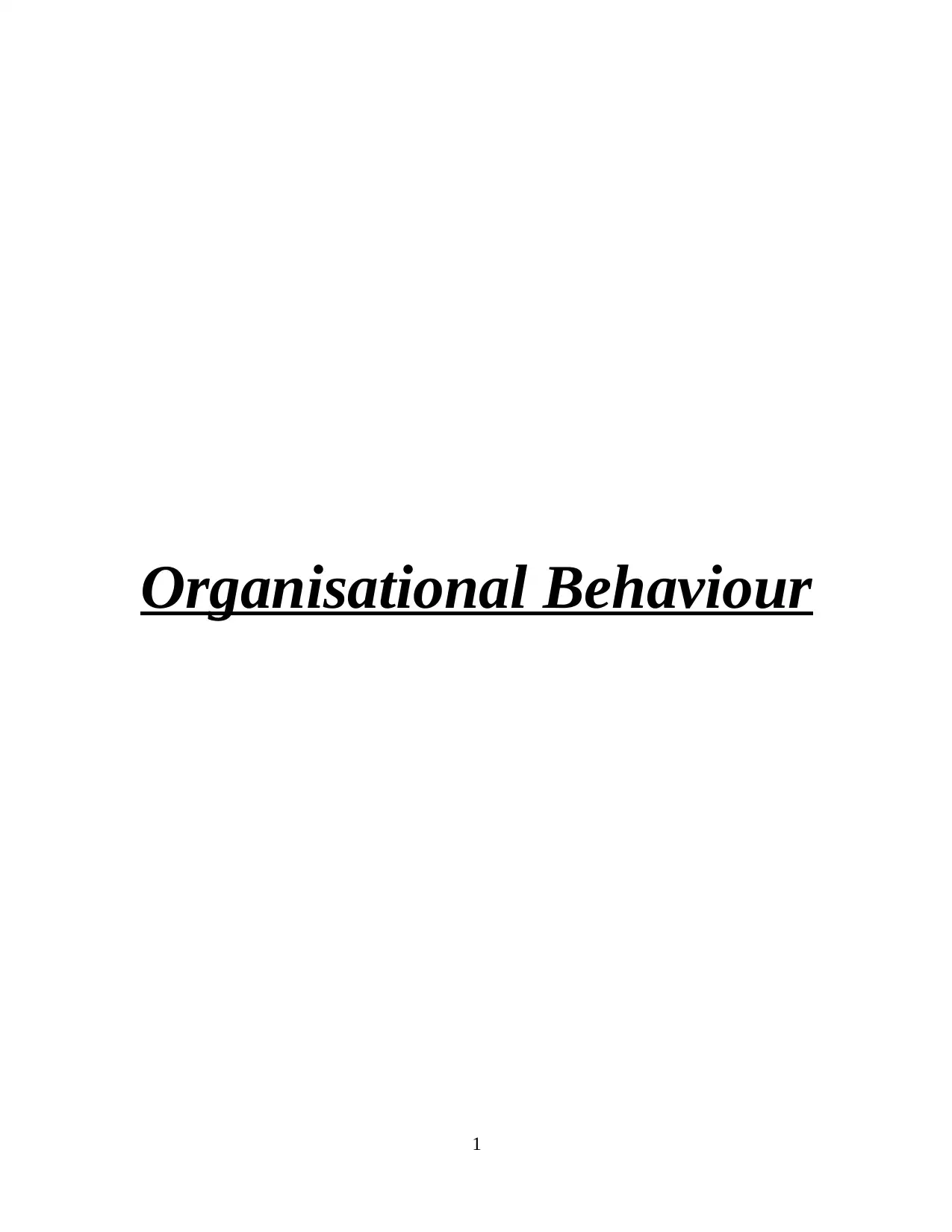
Organisational Behaviour
1
1
Paraphrase This Document
Need a fresh take? Get an instant paraphrase of this document with our AI Paraphraser
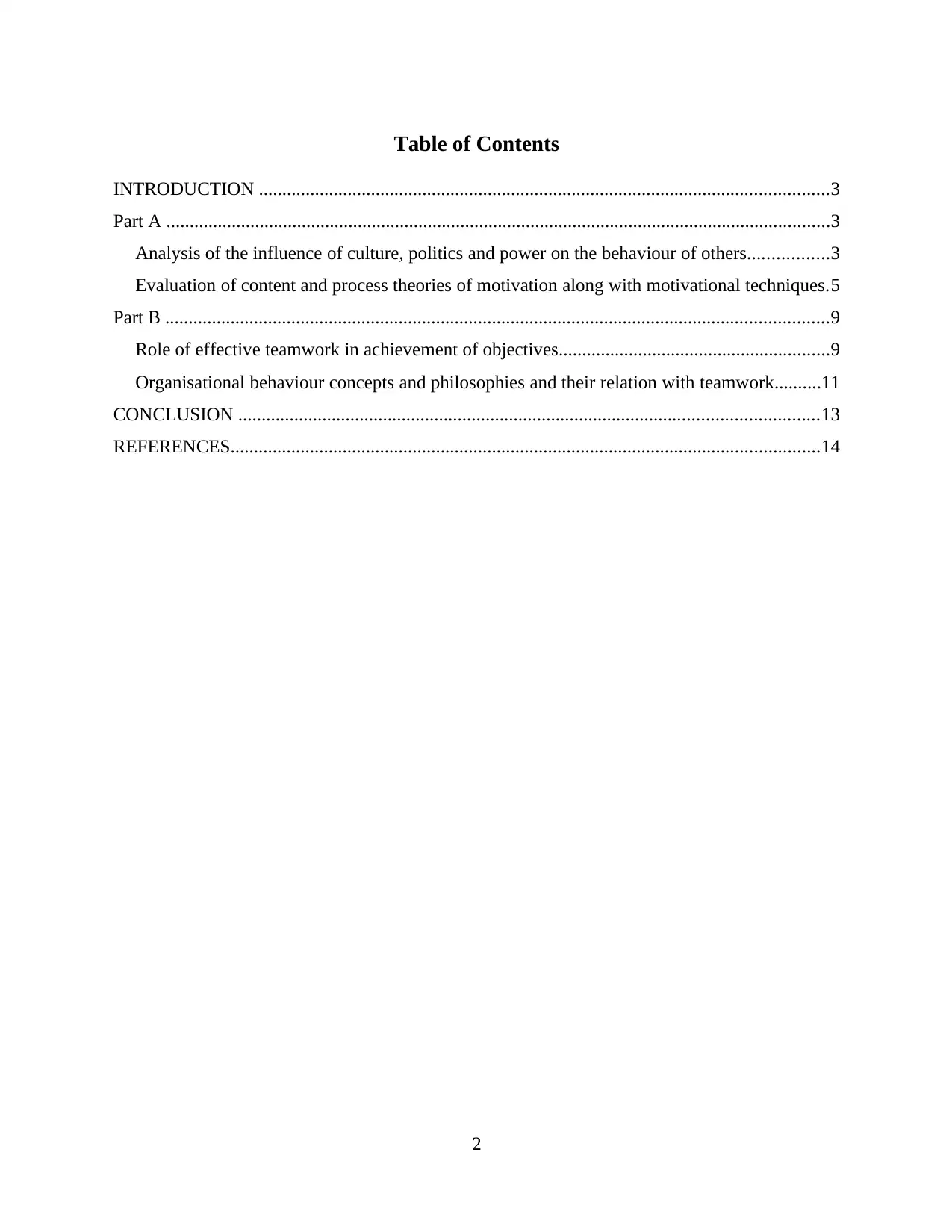
Table of Contents
INTRODUCTION ..........................................................................................................................3
Part A ..............................................................................................................................................3
Analysis of the influence of culture, politics and power on the behaviour of others.................3
Evaluation of content and process theories of motivation along with motivational techniques.5
Part B ..............................................................................................................................................9
Role of effective teamwork in achievement of objectives..........................................................9
Organisational behaviour concepts and philosophies and their relation with teamwork..........11
CONCLUSION ............................................................................................................................13
REFERENCES..............................................................................................................................14
2
INTRODUCTION ..........................................................................................................................3
Part A ..............................................................................................................................................3
Analysis of the influence of culture, politics and power on the behaviour of others.................3
Evaluation of content and process theories of motivation along with motivational techniques.5
Part B ..............................................................................................................................................9
Role of effective teamwork in achievement of objectives..........................................................9
Organisational behaviour concepts and philosophies and their relation with teamwork..........11
CONCLUSION ............................................................................................................................13
REFERENCES..............................................................................................................................14
2
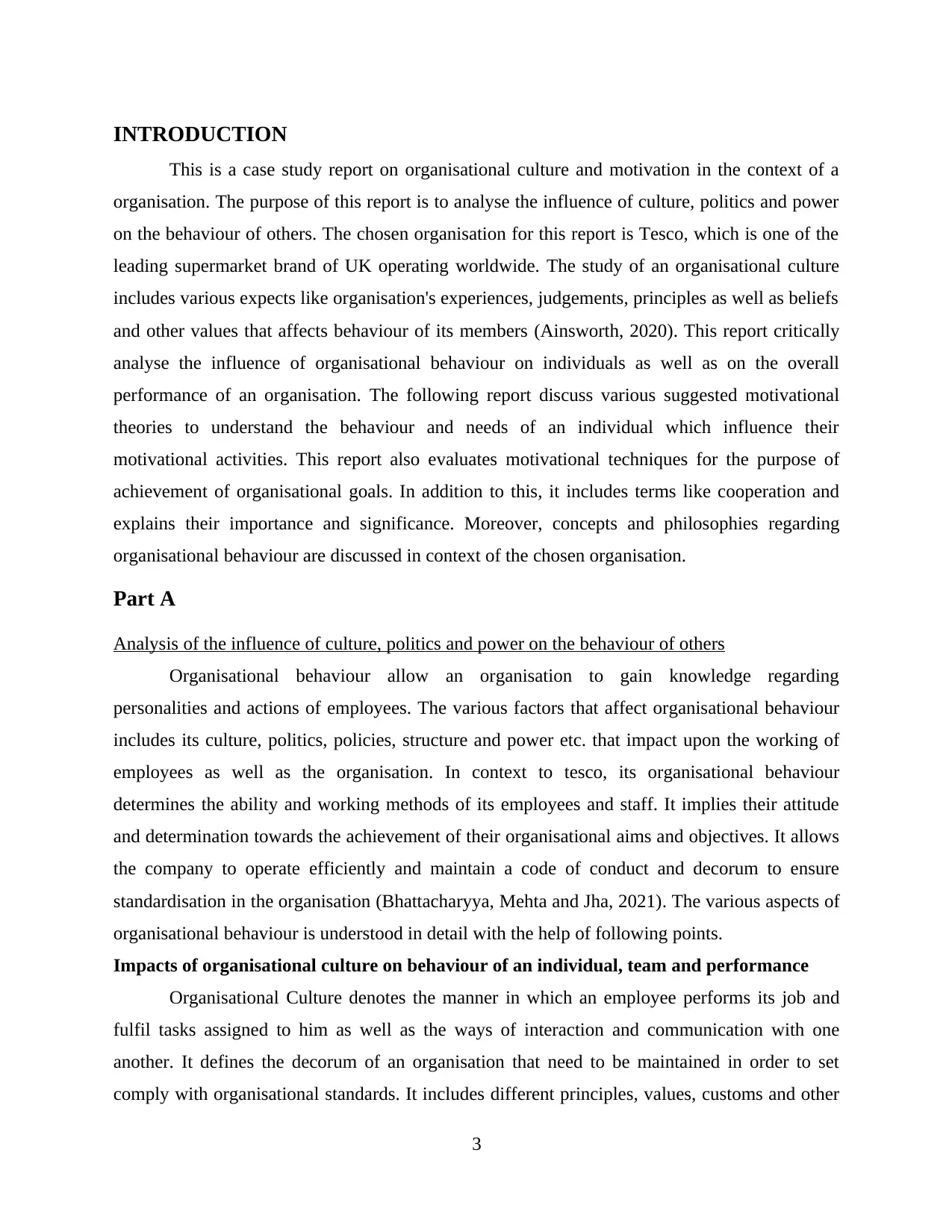
INTRODUCTION
This is a case study report on organisational culture and motivation in the context of a
organisation. The purpose of this report is to analyse the influence of culture, politics and power
on the behaviour of others. The chosen organisation for this report is Tesco, which is one of the
leading supermarket brand of UK operating worldwide. The study of an organisational culture
includes various expects like organisation's experiences, judgements, principles as well as beliefs
and other values that affects behaviour of its members (Ainsworth, 2020). This report critically
analyse the influence of organisational behaviour on individuals as well as on the overall
performance of an organisation. The following report discuss various suggested motivational
theories to understand the behaviour and needs of an individual which influence their
motivational activities. This report also evaluates motivational techniques for the purpose of
achievement of organisational goals. In addition to this, it includes terms like cooperation and
explains their importance and significance. Moreover, concepts and philosophies regarding
organisational behaviour are discussed in context of the chosen organisation.
Part A
Analysis of the influence of culture, politics and power on the behaviour of others
Organisational behaviour allow an organisation to gain knowledge regarding
personalities and actions of employees. The various factors that affect organisational behaviour
includes its culture, politics, policies, structure and power etc. that impact upon the working of
employees as well as the organisation. In context to tesco, its organisational behaviour
determines the ability and working methods of its employees and staff. It implies their attitude
and determination towards the achievement of their organisational aims and objectives. It allows
the company to operate efficiently and maintain a code of conduct and decorum to ensure
standardisation in the organisation (Bhattacharyya, Mehta and Jha, 2021). The various aspects of
organisational behaviour is understood in detail with the help of following points.
Impacts of organisational culture on behaviour of an individual, team and performance
Organisational Culture denotes the manner in which an employee performs its job and
fulfil tasks assigned to him as well as the ways of interaction and communication with one
another. It defines the decorum of an organisation that need to be maintained in order to set
comply with organisational standards. It includes different principles, values, customs and other
3
This is a case study report on organisational culture and motivation in the context of a
organisation. The purpose of this report is to analyse the influence of culture, politics and power
on the behaviour of others. The chosen organisation for this report is Tesco, which is one of the
leading supermarket brand of UK operating worldwide. The study of an organisational culture
includes various expects like organisation's experiences, judgements, principles as well as beliefs
and other values that affects behaviour of its members (Ainsworth, 2020). This report critically
analyse the influence of organisational behaviour on individuals as well as on the overall
performance of an organisation. The following report discuss various suggested motivational
theories to understand the behaviour and needs of an individual which influence their
motivational activities. This report also evaluates motivational techniques for the purpose of
achievement of organisational goals. In addition to this, it includes terms like cooperation and
explains their importance and significance. Moreover, concepts and philosophies regarding
organisational behaviour are discussed in context of the chosen organisation.
Part A
Analysis of the influence of culture, politics and power on the behaviour of others
Organisational behaviour allow an organisation to gain knowledge regarding
personalities and actions of employees. The various factors that affect organisational behaviour
includes its culture, politics, policies, structure and power etc. that impact upon the working of
employees as well as the organisation. In context to tesco, its organisational behaviour
determines the ability and working methods of its employees and staff. It implies their attitude
and determination towards the achievement of their organisational aims and objectives. It allows
the company to operate efficiently and maintain a code of conduct and decorum to ensure
standardisation in the organisation (Bhattacharyya, Mehta and Jha, 2021). The various aspects of
organisational behaviour is understood in detail with the help of following points.
Impacts of organisational culture on behaviour of an individual, team and performance
Organisational Culture denotes the manner in which an employee performs its job and
fulfil tasks assigned to him as well as the ways of interaction and communication with one
another. It defines the decorum of an organisation that need to be maintained in order to set
comply with organisational standards. It includes different principles, values, customs and other
3
⊘ This is a preview!⊘
Do you want full access?
Subscribe today to unlock all pages.

Trusted by 1+ million students worldwide
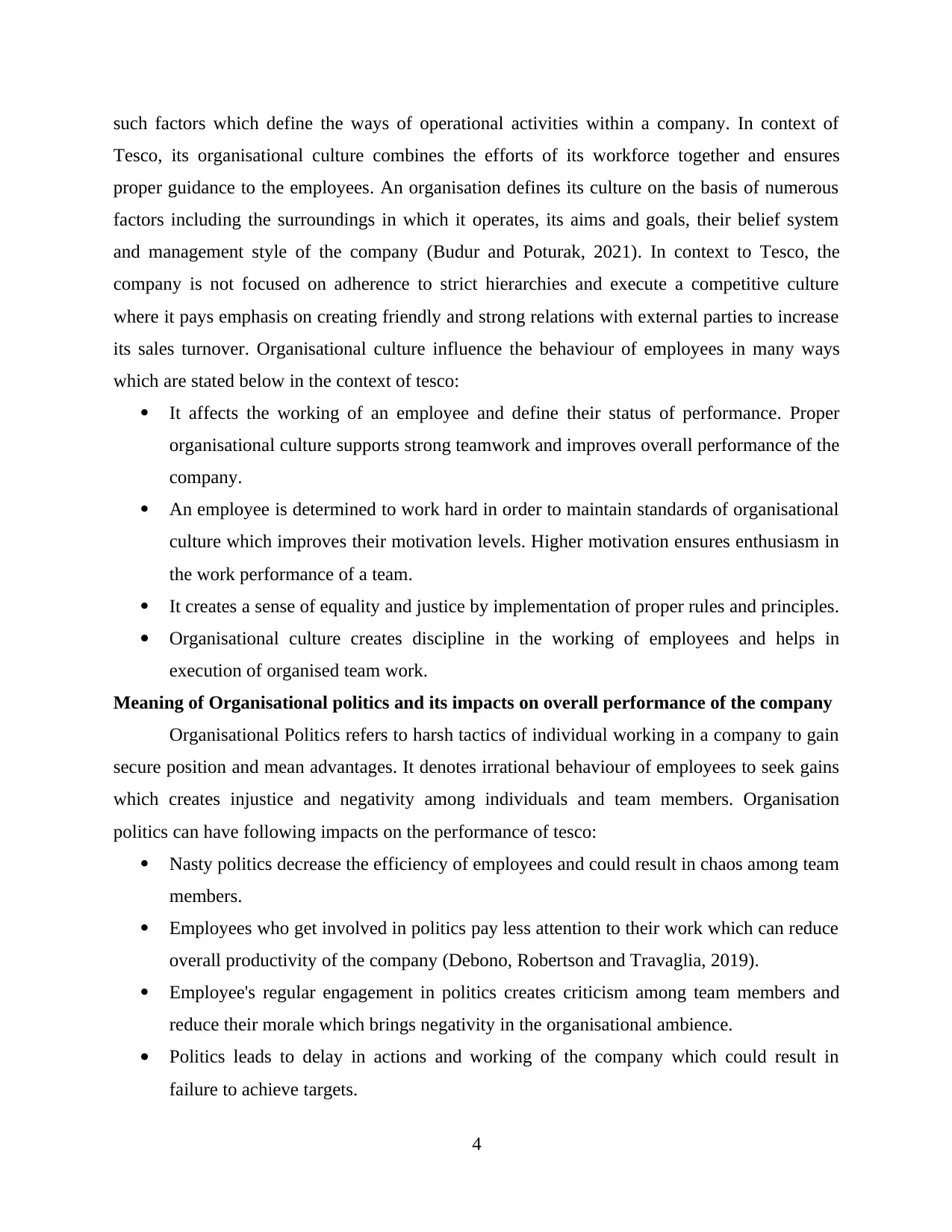
such factors which define the ways of operational activities within a company. In context of
Tesco, its organisational culture combines the efforts of its workforce together and ensures
proper guidance to the employees. An organisation defines its culture on the basis of numerous
factors including the surroundings in which it operates, its aims and goals, their belief system
and management style of the company (Budur and Poturak, 2021). In context to Tesco, the
company is not focused on adherence to strict hierarchies and execute a competitive culture
where it pays emphasis on creating friendly and strong relations with external parties to increase
its sales turnover. Organisational culture influence the behaviour of employees in many ways
which are stated below in the context of tesco:
It affects the working of an employee and define their status of performance. Proper
organisational culture supports strong teamwork and improves overall performance of the
company.
An employee is determined to work hard in order to maintain standards of organisational
culture which improves their motivation levels. Higher motivation ensures enthusiasm in
the work performance of a team.
It creates a sense of equality and justice by implementation of proper rules and principles.
Organisational culture creates discipline in the working of employees and helps in
execution of organised team work.
Meaning of Organisational politics and its impacts on overall performance of the company
Organisational Politics refers to harsh tactics of individual working in a company to gain
secure position and mean advantages. It denotes irrational behaviour of employees to seek gains
which creates injustice and negativity among individuals and team members. Organisation
politics can have following impacts on the performance of tesco:
Nasty politics decrease the efficiency of employees and could result in chaos among team
members.
Employees who get involved in politics pay less attention to their work which can reduce
overall productivity of the company (Debono, Robertson and Travaglia, 2019).
Employee's regular engagement in politics creates criticism among team members and
reduce their morale which brings negativity in the organisational ambience.
Politics leads to delay in actions and working of the company which could result in
failure to achieve targets.
4
Tesco, its organisational culture combines the efforts of its workforce together and ensures
proper guidance to the employees. An organisation defines its culture on the basis of numerous
factors including the surroundings in which it operates, its aims and goals, their belief system
and management style of the company (Budur and Poturak, 2021). In context to Tesco, the
company is not focused on adherence to strict hierarchies and execute a competitive culture
where it pays emphasis on creating friendly and strong relations with external parties to increase
its sales turnover. Organisational culture influence the behaviour of employees in many ways
which are stated below in the context of tesco:
It affects the working of an employee and define their status of performance. Proper
organisational culture supports strong teamwork and improves overall performance of the
company.
An employee is determined to work hard in order to maintain standards of organisational
culture which improves their motivation levels. Higher motivation ensures enthusiasm in
the work performance of a team.
It creates a sense of equality and justice by implementation of proper rules and principles.
Organisational culture creates discipline in the working of employees and helps in
execution of organised team work.
Meaning of Organisational politics and its impacts on overall performance of the company
Organisational Politics refers to harsh tactics of individual working in a company to gain
secure position and mean advantages. It denotes irrational behaviour of employees to seek gains
which creates injustice and negativity among individuals and team members. Organisation
politics can have following impacts on the performance of tesco:
Nasty politics decrease the efficiency of employees and could result in chaos among team
members.
Employees who get involved in politics pay less attention to their work which can reduce
overall productivity of the company (Debono, Robertson and Travaglia, 2019).
Employee's regular engagement in politics creates criticism among team members and
reduce their morale which brings negativity in the organisational ambience.
Politics leads to delay in actions and working of the company which could result in
failure to achieve targets.
4
Paraphrase This Document
Need a fresh take? Get an instant paraphrase of this document with our AI Paraphraser
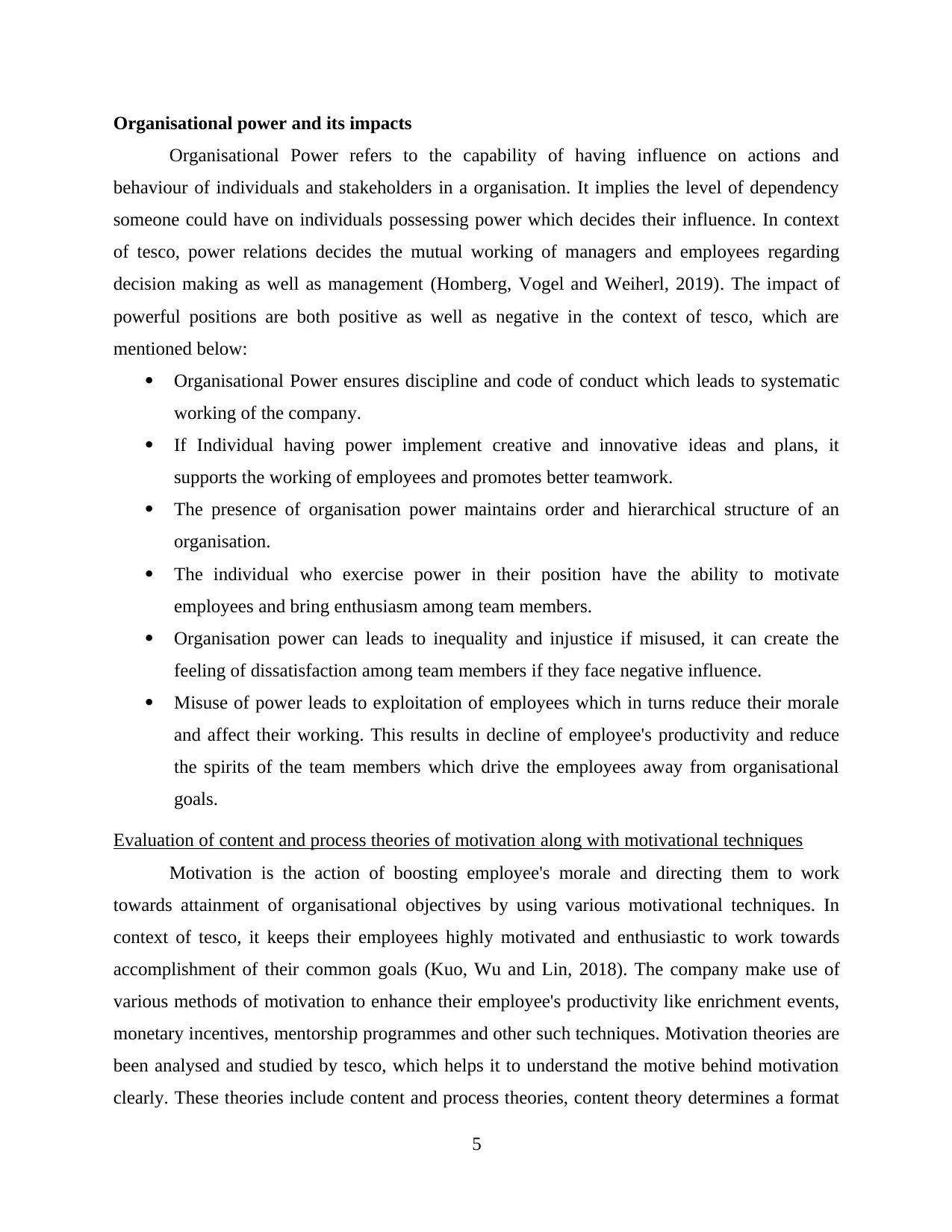
Organisational power and its impacts
Organisational Power refers to the capability of having influence on actions and
behaviour of individuals and stakeholders in a organisation. It implies the level of dependency
someone could have on individuals possessing power which decides their influence. In context
of tesco, power relations decides the mutual working of managers and employees regarding
decision making as well as management (Homberg, Vogel and Weiherl, 2019). The impact of
powerful positions are both positive as well as negative in the context of tesco, which are
mentioned below:
Organisational Power ensures discipline and code of conduct which leads to systematic
working of the company.
If Individual having power implement creative and innovative ideas and plans, it
supports the working of employees and promotes better teamwork.
The presence of organisation power maintains order and hierarchical structure of an
organisation.
The individual who exercise power in their position have the ability to motivate
employees and bring enthusiasm among team members.
Organisation power can leads to inequality and injustice if misused, it can create the
feeling of dissatisfaction among team members if they face negative influence.
Misuse of power leads to exploitation of employees which in turns reduce their morale
and affect their working. This results in decline of employee's productivity and reduce
the spirits of the team members which drive the employees away from organisational
goals.
Evaluation of content and process theories of motivation along with motivational techniques
Motivation is the action of boosting employee's morale and directing them to work
towards attainment of organisational objectives by using various motivational techniques. In
context of tesco, it keeps their employees highly motivated and enthusiastic to work towards
accomplishment of their common goals (Kuo, Wu and Lin, 2018). The company make use of
various methods of motivation to enhance their employee's productivity like enrichment events,
monetary incentives, mentorship programmes and other such techniques. Motivation theories are
been analysed and studied by tesco, which helps it to understand the motive behind motivation
clearly. These theories include content and process theories, content theory determines a format
5
Organisational Power refers to the capability of having influence on actions and
behaviour of individuals and stakeholders in a organisation. It implies the level of dependency
someone could have on individuals possessing power which decides their influence. In context
of tesco, power relations decides the mutual working of managers and employees regarding
decision making as well as management (Homberg, Vogel and Weiherl, 2019). The impact of
powerful positions are both positive as well as negative in the context of tesco, which are
mentioned below:
Organisational Power ensures discipline and code of conduct which leads to systematic
working of the company.
If Individual having power implement creative and innovative ideas and plans, it
supports the working of employees and promotes better teamwork.
The presence of organisation power maintains order and hierarchical structure of an
organisation.
The individual who exercise power in their position have the ability to motivate
employees and bring enthusiasm among team members.
Organisation power can leads to inequality and injustice if misused, it can create the
feeling of dissatisfaction among team members if they face negative influence.
Misuse of power leads to exploitation of employees which in turns reduce their morale
and affect their working. This results in decline of employee's productivity and reduce
the spirits of the team members which drive the employees away from organisational
goals.
Evaluation of content and process theories of motivation along with motivational techniques
Motivation is the action of boosting employee's morale and directing them to work
towards attainment of organisational objectives by using various motivational techniques. In
context of tesco, it keeps their employees highly motivated and enthusiastic to work towards
accomplishment of their common goals (Kuo, Wu and Lin, 2018). The company make use of
various methods of motivation to enhance their employee's productivity like enrichment events,
monetary incentives, mentorship programmes and other such techniques. Motivation theories are
been analysed and studied by tesco, which helps it to understand the motive behind motivation
clearly. These theories include content and process theories, content theory determines a format
5
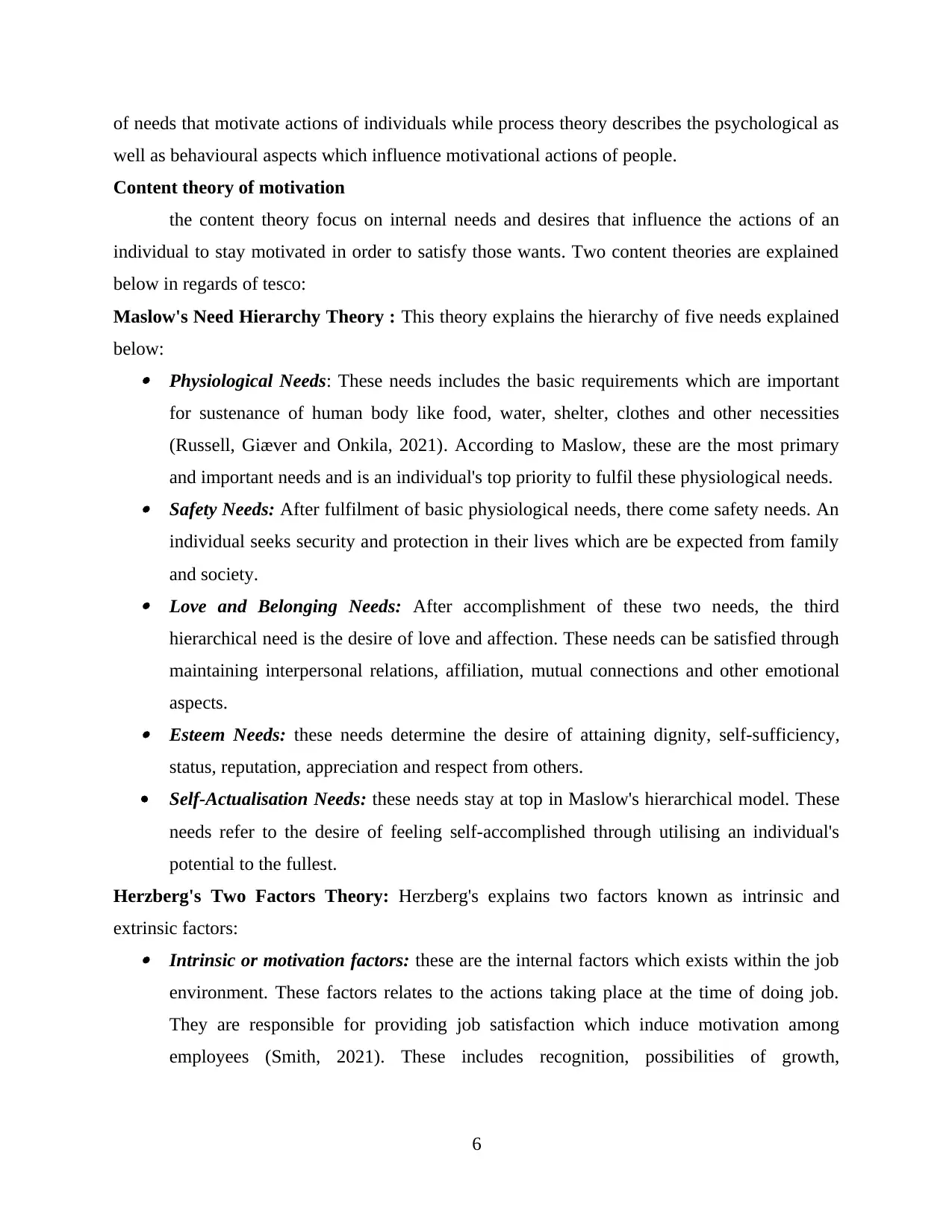
of needs that motivate actions of individuals while process theory describes the psychological as
well as behavioural aspects which influence motivational actions of people.
Content theory of motivation
the content theory focus on internal needs and desires that influence the actions of an
individual to stay motivated in order to satisfy those wants. Two content theories are explained
below in regards of tesco:
Maslow's Need Hierarchy Theory : This theory explains the hierarchy of five needs explained
below: Physiological Needs: These needs includes the basic requirements which are important
for sustenance of human body like food, water, shelter, clothes and other necessities
(Russell, Giæver and Onkila, 2021). According to Maslow, these are the most primary
and important needs and is an individual's top priority to fulfil these physiological needs. Safety Needs: After fulfilment of basic physiological needs, there come safety needs. An
individual seeks security and protection in their lives which are be expected from family
and society. Love and Belonging Needs: After accomplishment of these two needs, the third
hierarchical need is the desire of love and affection. These needs can be satisfied through
maintaining interpersonal relations, affiliation, mutual connections and other emotional
aspects. Esteem Needs: these needs determine the desire of attaining dignity, self-sufficiency,
status, reputation, appreciation and respect from others.
Self-Actualisation Needs: these needs stay at top in Maslow's hierarchical model. These
needs refer to the desire of feeling self-accomplished through utilising an individual's
potential to the fullest.
Herzberg's Two Factors Theory: Herzberg's explains two factors known as intrinsic and
extrinsic factors: Intrinsic or motivation factors: these are the internal factors which exists within the job
environment. These factors relates to the actions taking place at the time of doing job.
They are responsible for providing job satisfaction which induce motivation among
employees (Smith, 2021). These includes recognition, possibilities of growth,
6
well as behavioural aspects which influence motivational actions of people.
Content theory of motivation
the content theory focus on internal needs and desires that influence the actions of an
individual to stay motivated in order to satisfy those wants. Two content theories are explained
below in regards of tesco:
Maslow's Need Hierarchy Theory : This theory explains the hierarchy of five needs explained
below: Physiological Needs: These needs includes the basic requirements which are important
for sustenance of human body like food, water, shelter, clothes and other necessities
(Russell, Giæver and Onkila, 2021). According to Maslow, these are the most primary
and important needs and is an individual's top priority to fulfil these physiological needs. Safety Needs: After fulfilment of basic physiological needs, there come safety needs. An
individual seeks security and protection in their lives which are be expected from family
and society. Love and Belonging Needs: After accomplishment of these two needs, the third
hierarchical need is the desire of love and affection. These needs can be satisfied through
maintaining interpersonal relations, affiliation, mutual connections and other emotional
aspects. Esteem Needs: these needs determine the desire of attaining dignity, self-sufficiency,
status, reputation, appreciation and respect from others.
Self-Actualisation Needs: these needs stay at top in Maslow's hierarchical model. These
needs refer to the desire of feeling self-accomplished through utilising an individual's
potential to the fullest.
Herzberg's Two Factors Theory: Herzberg's explains two factors known as intrinsic and
extrinsic factors: Intrinsic or motivation factors: these are the internal factors which exists within the job
environment. These factors relates to the actions taking place at the time of doing job.
They are responsible for providing job satisfaction which induce motivation among
employees (Smith, 2021). These includes recognition, possibilities of growth,
6
⊘ This is a preview!⊘
Do you want full access?
Subscribe today to unlock all pages.

Trusted by 1+ million students worldwide
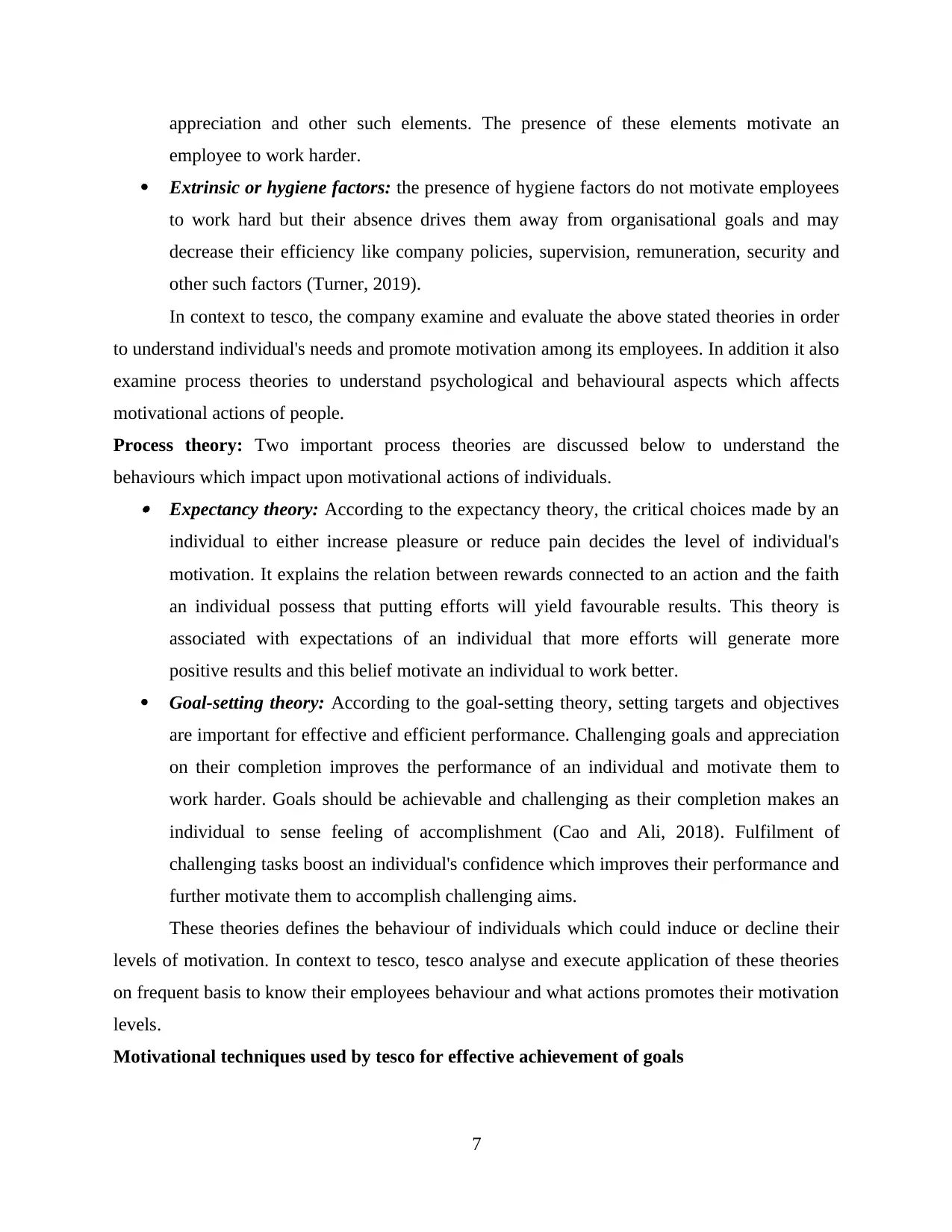
appreciation and other such elements. The presence of these elements motivate an
employee to work harder.
Extrinsic or hygiene factors: the presence of hygiene factors do not motivate employees
to work hard but their absence drives them away from organisational goals and may
decrease their efficiency like company policies, supervision, remuneration, security and
other such factors (Turner, 2019).
In context to tesco, the company examine and evaluate the above stated theories in order
to understand individual's needs and promote motivation among its employees. In addition it also
examine process theories to understand psychological and behavioural aspects which affects
motivational actions of people.
Process theory: Two important process theories are discussed below to understand the
behaviours which impact upon motivational actions of individuals. Expectancy theory: According to the expectancy theory, the critical choices made by an
individual to either increase pleasure or reduce pain decides the level of individual's
motivation. It explains the relation between rewards connected to an action and the faith
an individual possess that putting efforts will yield favourable results. This theory is
associated with expectations of an individual that more efforts will generate more
positive results and this belief motivate an individual to work better.
Goal-setting theory: According to the goal-setting theory, setting targets and objectives
are important for effective and efficient performance. Challenging goals and appreciation
on their completion improves the performance of an individual and motivate them to
work harder. Goals should be achievable and challenging as their completion makes an
individual to sense feeling of accomplishment (Cao and Ali, 2018). Fulfilment of
challenging tasks boost an individual's confidence which improves their performance and
further motivate them to accomplish challenging aims.
These theories defines the behaviour of individuals which could induce or decline their
levels of motivation. In context to tesco, tesco analyse and execute application of these theories
on frequent basis to know their employees behaviour and what actions promotes their motivation
levels.
Motivational techniques used by tesco for effective achievement of goals
7
employee to work harder.
Extrinsic or hygiene factors: the presence of hygiene factors do not motivate employees
to work hard but their absence drives them away from organisational goals and may
decrease their efficiency like company policies, supervision, remuneration, security and
other such factors (Turner, 2019).
In context to tesco, the company examine and evaluate the above stated theories in order
to understand individual's needs and promote motivation among its employees. In addition it also
examine process theories to understand psychological and behavioural aspects which affects
motivational actions of people.
Process theory: Two important process theories are discussed below to understand the
behaviours which impact upon motivational actions of individuals. Expectancy theory: According to the expectancy theory, the critical choices made by an
individual to either increase pleasure or reduce pain decides the level of individual's
motivation. It explains the relation between rewards connected to an action and the faith
an individual possess that putting efforts will yield favourable results. This theory is
associated with expectations of an individual that more efforts will generate more
positive results and this belief motivate an individual to work better.
Goal-setting theory: According to the goal-setting theory, setting targets and objectives
are important for effective and efficient performance. Challenging goals and appreciation
on their completion improves the performance of an individual and motivate them to
work harder. Goals should be achievable and challenging as their completion makes an
individual to sense feeling of accomplishment (Cao and Ali, 2018). Fulfilment of
challenging tasks boost an individual's confidence which improves their performance and
further motivate them to accomplish challenging aims.
These theories defines the behaviour of individuals which could induce or decline their
levels of motivation. In context to tesco, tesco analyse and execute application of these theories
on frequent basis to know their employees behaviour and what actions promotes their motivation
levels.
Motivational techniques used by tesco for effective achievement of goals
7
Paraphrase This Document
Need a fresh take? Get an instant paraphrase of this document with our AI Paraphraser
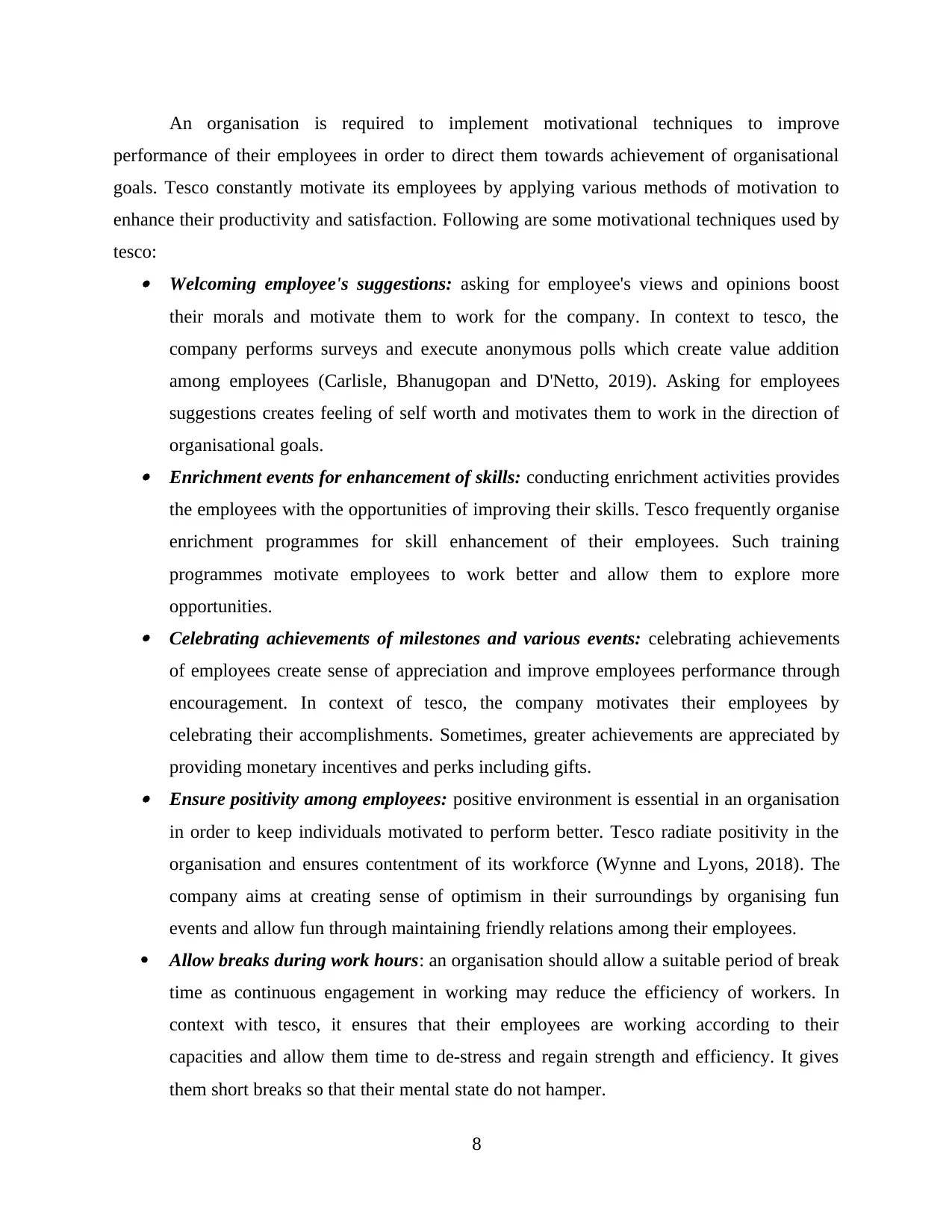
An organisation is required to implement motivational techniques to improve
performance of their employees in order to direct them towards achievement of organisational
goals. Tesco constantly motivate its employees by applying various methods of motivation to
enhance their productivity and satisfaction. Following are some motivational techniques used by
tesco: Welcoming employee's suggestions: asking for employee's views and opinions boost
their morals and motivate them to work for the company. In context to tesco, the
company performs surveys and execute anonymous polls which create value addition
among employees (Carlisle, Bhanugopan and D'Netto, 2019). Asking for employees
suggestions creates feeling of self worth and motivates them to work in the direction of
organisational goals. Enrichment events for enhancement of skills: conducting enrichment activities provides
the employees with the opportunities of improving their skills. Tesco frequently organise
enrichment programmes for skill enhancement of their employees. Such training
programmes motivate employees to work better and allow them to explore more
opportunities. Celebrating achievements of milestones and various events: celebrating achievements
of employees create sense of appreciation and improve employees performance through
encouragement. In context of tesco, the company motivates their employees by
celebrating their accomplishments. Sometimes, greater achievements are appreciated by
providing monetary incentives and perks including gifts. Ensure positivity among employees: positive environment is essential in an organisation
in order to keep individuals motivated to perform better. Tesco radiate positivity in the
organisation and ensures contentment of its workforce (Wynne and Lyons, 2018). The
company aims at creating sense of optimism in their surroundings by organising fun
events and allow fun through maintaining friendly relations among their employees.
Allow breaks during work hours: an organisation should allow a suitable period of break
time as continuous engagement in working may reduce the efficiency of workers. In
context with tesco, it ensures that their employees are working according to their
capacities and allow them time to de-stress and regain strength and efficiency. It gives
them short breaks so that their mental state do not hamper.
8
performance of their employees in order to direct them towards achievement of organisational
goals. Tesco constantly motivate its employees by applying various methods of motivation to
enhance their productivity and satisfaction. Following are some motivational techniques used by
tesco: Welcoming employee's suggestions: asking for employee's views and opinions boost
their morals and motivate them to work for the company. In context to tesco, the
company performs surveys and execute anonymous polls which create value addition
among employees (Carlisle, Bhanugopan and D'Netto, 2019). Asking for employees
suggestions creates feeling of self worth and motivates them to work in the direction of
organisational goals. Enrichment events for enhancement of skills: conducting enrichment activities provides
the employees with the opportunities of improving their skills. Tesco frequently organise
enrichment programmes for skill enhancement of their employees. Such training
programmes motivate employees to work better and allow them to explore more
opportunities. Celebrating achievements of milestones and various events: celebrating achievements
of employees create sense of appreciation and improve employees performance through
encouragement. In context of tesco, the company motivates their employees by
celebrating their accomplishments. Sometimes, greater achievements are appreciated by
providing monetary incentives and perks including gifts. Ensure positivity among employees: positive environment is essential in an organisation
in order to keep individuals motivated to perform better. Tesco radiate positivity in the
organisation and ensures contentment of its workforce (Wynne and Lyons, 2018). The
company aims at creating sense of optimism in their surroundings by organising fun
events and allow fun through maintaining friendly relations among their employees.
Allow breaks during work hours: an organisation should allow a suitable period of break
time as continuous engagement in working may reduce the efficiency of workers. In
context with tesco, it ensures that their employees are working according to their
capacities and allow them time to de-stress and regain strength and efficiency. It gives
them short breaks so that their mental state do not hamper.
8
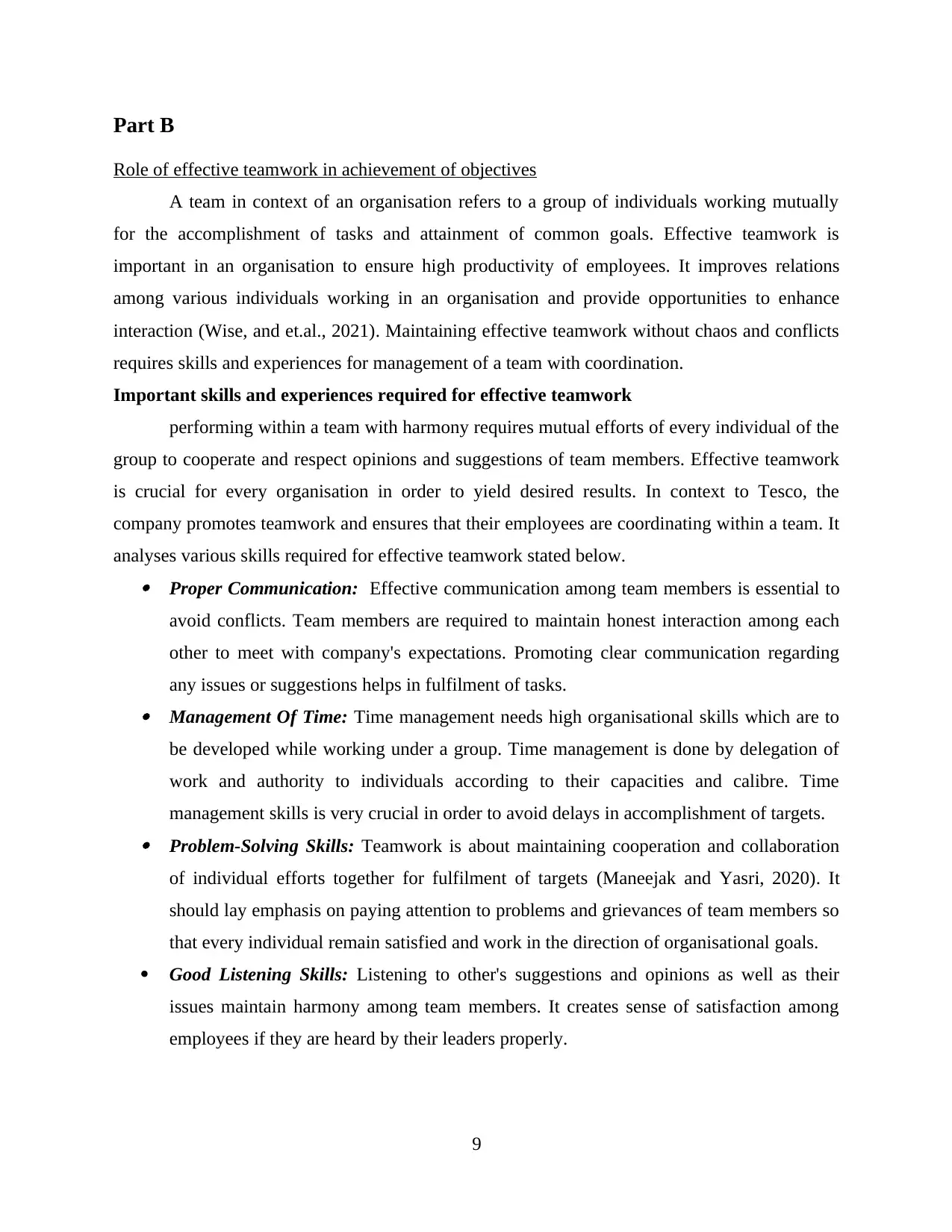
Part B
Role of effective teamwork in achievement of objectives
A team in context of an organisation refers to a group of individuals working mutually
for the accomplishment of tasks and attainment of common goals. Effective teamwork is
important in an organisation to ensure high productivity of employees. It improves relations
among various individuals working in an organisation and provide opportunities to enhance
interaction (Wise, and et.al., 2021). Maintaining effective teamwork without chaos and conflicts
requires skills and experiences for management of a team with coordination.
Important skills and experiences required for effective teamwork
performing within a team with harmony requires mutual efforts of every individual of the
group to cooperate and respect opinions and suggestions of team members. Effective teamwork
is crucial for every organisation in order to yield desired results. In context to Tesco, the
company promotes teamwork and ensures that their employees are coordinating within a team. It
analyses various skills required for effective teamwork stated below. Proper Communication: Effective communication among team members is essential to
avoid conflicts. Team members are required to maintain honest interaction among each
other to meet with company's expectations. Promoting clear communication regarding
any issues or suggestions helps in fulfilment of tasks. Management Of Time: Time management needs high organisational skills which are to
be developed while working under a group. Time management is done by delegation of
work and authority to individuals according to their capacities and calibre. Time
management skills is very crucial in order to avoid delays in accomplishment of targets. Problem-Solving Skills: Teamwork is about maintaining cooperation and collaboration
of individual efforts together for fulfilment of targets (Maneejak and Yasri, 2020). It
should lay emphasis on paying attention to problems and grievances of team members so
that every individual remain satisfied and work in the direction of organisational goals.
Good Listening Skills: Listening to other's suggestions and opinions as well as their
issues maintain harmony among team members. It creates sense of satisfaction among
employees if they are heard by their leaders properly.
9
Role of effective teamwork in achievement of objectives
A team in context of an organisation refers to a group of individuals working mutually
for the accomplishment of tasks and attainment of common goals. Effective teamwork is
important in an organisation to ensure high productivity of employees. It improves relations
among various individuals working in an organisation and provide opportunities to enhance
interaction (Wise, and et.al., 2021). Maintaining effective teamwork without chaos and conflicts
requires skills and experiences for management of a team with coordination.
Important skills and experiences required for effective teamwork
performing within a team with harmony requires mutual efforts of every individual of the
group to cooperate and respect opinions and suggestions of team members. Effective teamwork
is crucial for every organisation in order to yield desired results. In context to Tesco, the
company promotes teamwork and ensures that their employees are coordinating within a team. It
analyses various skills required for effective teamwork stated below. Proper Communication: Effective communication among team members is essential to
avoid conflicts. Team members are required to maintain honest interaction among each
other to meet with company's expectations. Promoting clear communication regarding
any issues or suggestions helps in fulfilment of tasks. Management Of Time: Time management needs high organisational skills which are to
be developed while working under a group. Time management is done by delegation of
work and authority to individuals according to their capacities and calibre. Time
management skills is very crucial in order to avoid delays in accomplishment of targets. Problem-Solving Skills: Teamwork is about maintaining cooperation and collaboration
of individual efforts together for fulfilment of targets (Maneejak and Yasri, 2020). It
should lay emphasis on paying attention to problems and grievances of team members so
that every individual remain satisfied and work in the direction of organisational goals.
Good Listening Skills: Listening to other's suggestions and opinions as well as their
issues maintain harmony among team members. It creates sense of satisfaction among
employees if they are heard by their leaders properly.
9
⊘ This is a preview!⊘
Do you want full access?
Subscribe today to unlock all pages.

Trusted by 1+ million students worldwide
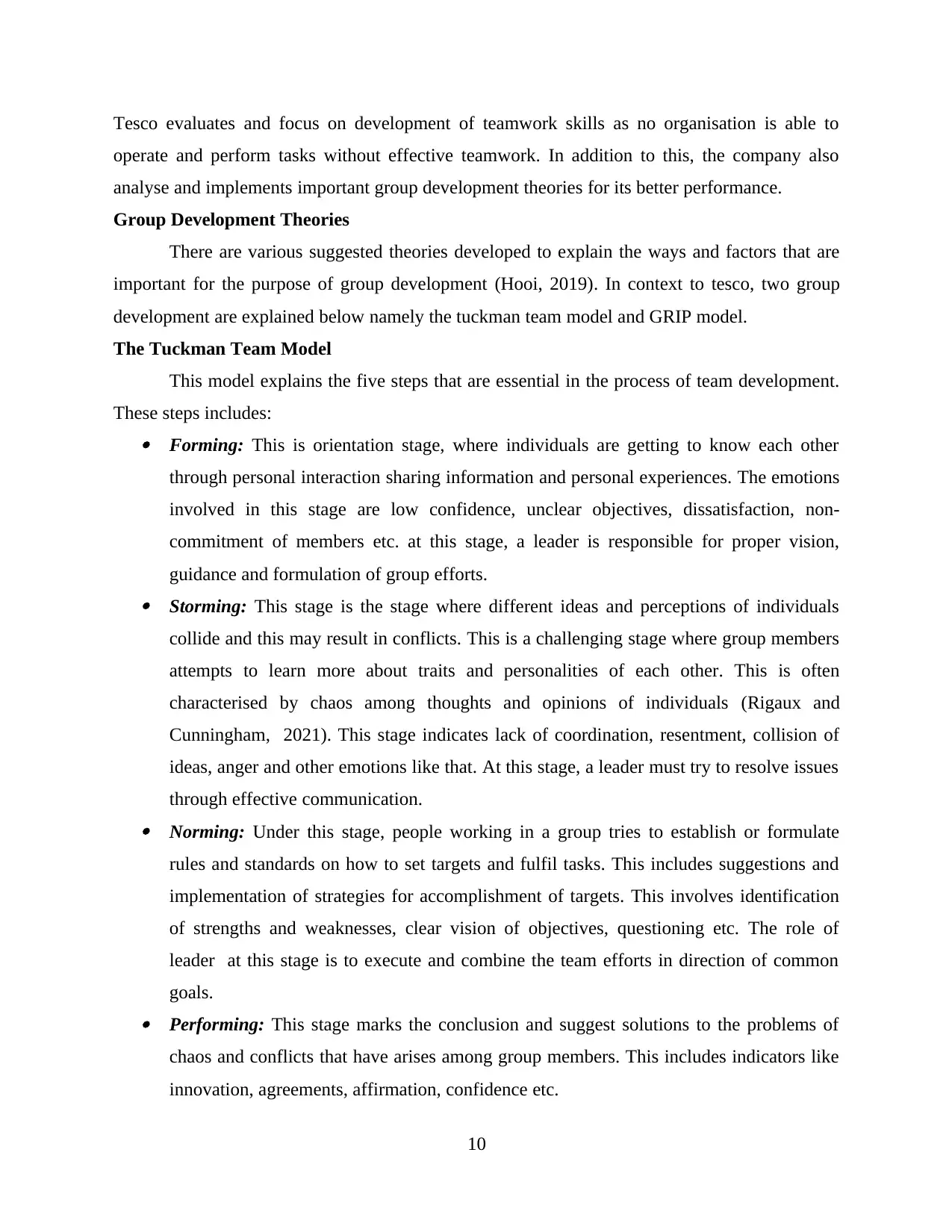
Tesco evaluates and focus on development of teamwork skills as no organisation is able to
operate and perform tasks without effective teamwork. In addition to this, the company also
analyse and implements important group development theories for its better performance.
Group Development Theories
There are various suggested theories developed to explain the ways and factors that are
important for the purpose of group development (Hooi, 2019). In context to tesco, two group
development are explained below namely the tuckman team model and GRIP model.
The Tuckman Team Model
This model explains the five steps that are essential in the process of team development.
These steps includes: Forming: This is orientation stage, where individuals are getting to know each other
through personal interaction sharing information and personal experiences. The emotions
involved in this stage are low confidence, unclear objectives, dissatisfaction, non-
commitment of members etc. at this stage, a leader is responsible for proper vision,
guidance and formulation of group efforts. Storming: This stage is the stage where different ideas and perceptions of individuals
collide and this may result in conflicts. This is a challenging stage where group members
attempts to learn more about traits and personalities of each other. This is often
characterised by chaos among thoughts and opinions of individuals (Rigaux and
Cunningham, 2021). This stage indicates lack of coordination, resentment, collision of
ideas, anger and other emotions like that. At this stage, a leader must try to resolve issues
through effective communication. Norming: Under this stage, people working in a group tries to establish or formulate
rules and standards on how to set targets and fulfil tasks. This includes suggestions and
implementation of strategies for accomplishment of targets. This involves identification
of strengths and weaknesses, clear vision of objectives, questioning etc. The role of
leader at this stage is to execute and combine the team efforts in direction of common
goals. Performing: This stage marks the conclusion and suggest solutions to the problems of
chaos and conflicts that have arises among group members. This includes indicators like
innovation, agreements, affirmation, confidence etc.
10
operate and perform tasks without effective teamwork. In addition to this, the company also
analyse and implements important group development theories for its better performance.
Group Development Theories
There are various suggested theories developed to explain the ways and factors that are
important for the purpose of group development (Hooi, 2019). In context to tesco, two group
development are explained below namely the tuckman team model and GRIP model.
The Tuckman Team Model
This model explains the five steps that are essential in the process of team development.
These steps includes: Forming: This is orientation stage, where individuals are getting to know each other
through personal interaction sharing information and personal experiences. The emotions
involved in this stage are low confidence, unclear objectives, dissatisfaction, non-
commitment of members etc. at this stage, a leader is responsible for proper vision,
guidance and formulation of group efforts. Storming: This stage is the stage where different ideas and perceptions of individuals
collide and this may result in conflicts. This is a challenging stage where group members
attempts to learn more about traits and personalities of each other. This is often
characterised by chaos among thoughts and opinions of individuals (Rigaux and
Cunningham, 2021). This stage indicates lack of coordination, resentment, collision of
ideas, anger and other emotions like that. At this stage, a leader must try to resolve issues
through effective communication. Norming: Under this stage, people working in a group tries to establish or formulate
rules and standards on how to set targets and fulfil tasks. This includes suggestions and
implementation of strategies for accomplishment of targets. This involves identification
of strengths and weaknesses, clear vision of objectives, questioning etc. The role of
leader at this stage is to execute and combine the team efforts in direction of common
goals. Performing: This stage marks the conclusion and suggest solutions to the problems of
chaos and conflicts that have arises among group members. This includes indicators like
innovation, agreements, affirmation, confidence etc.
10
Paraphrase This Document
Need a fresh take? Get an instant paraphrase of this document with our AI Paraphraser
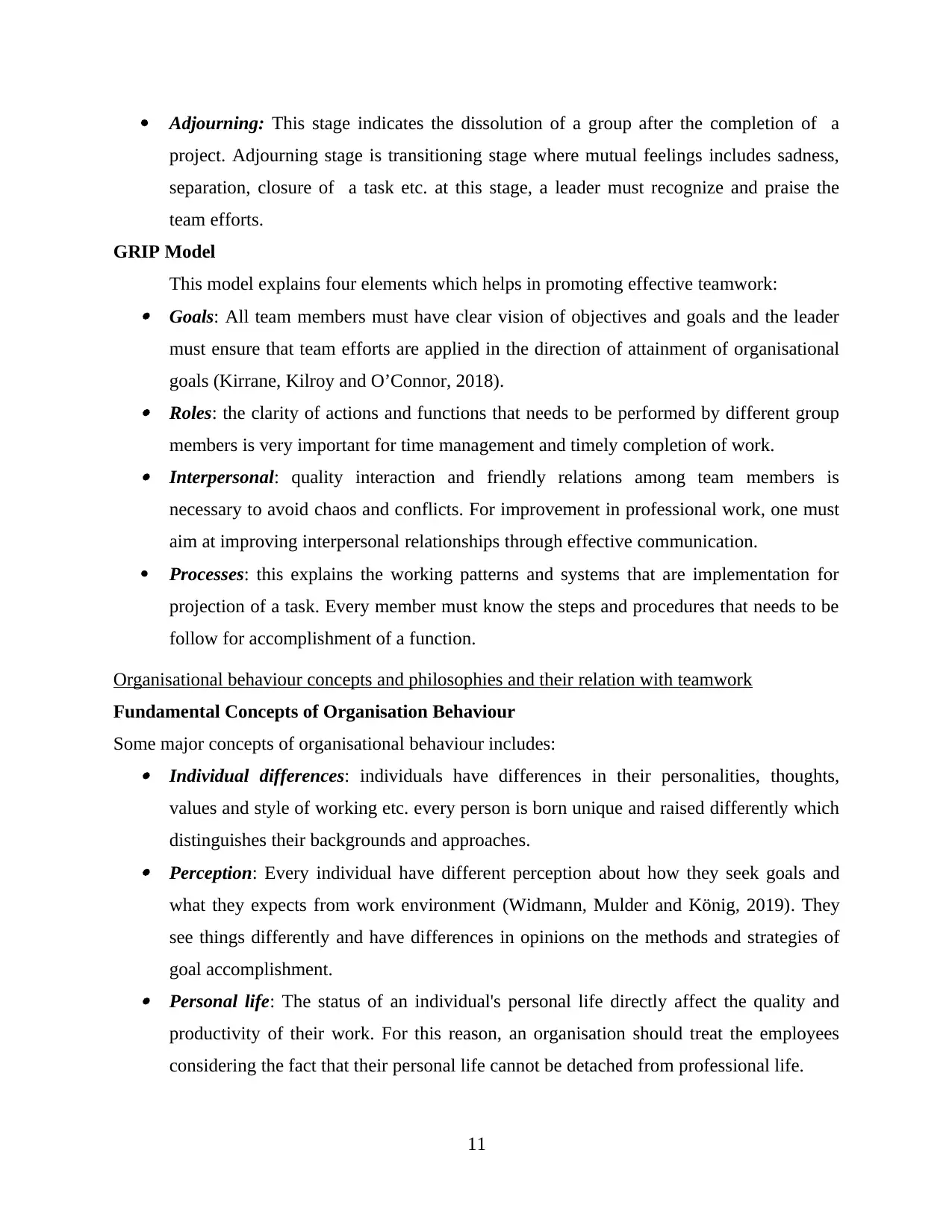
Adjourning: This stage indicates the dissolution of a group after the completion of a
project. Adjourning stage is transitioning stage where mutual feelings includes sadness,
separation, closure of a task etc. at this stage, a leader must recognize and praise the
team efforts.
GRIP Model
This model explains four elements which helps in promoting effective teamwork: Goals: All team members must have clear vision of objectives and goals and the leader
must ensure that team efforts are applied in the direction of attainment of organisational
goals (Kirrane, Kilroy and O’Connor, 2018). Roles: the clarity of actions and functions that needs to be performed by different group
members is very important for time management and timely completion of work. Interpersonal: quality interaction and friendly relations among team members is
necessary to avoid chaos and conflicts. For improvement in professional work, one must
aim at improving interpersonal relationships through effective communication.
Processes: this explains the working patterns and systems that are implementation for
projection of a task. Every member must know the steps and procedures that needs to be
follow for accomplishment of a function.
Organisational behaviour concepts and philosophies and their relation with teamwork
Fundamental Concepts of Organisation Behaviour
Some major concepts of organisational behaviour includes: Individual differences: individuals have differences in their personalities, thoughts,
values and style of working etc. every person is born unique and raised differently which
distinguishes their backgrounds and approaches. Perception: Every individual have different perception about how they seek goals and
what they expects from work environment (Widmann, Mulder and König, 2019). They
see things differently and have differences in opinions on the methods and strategies of
goal accomplishment. Personal life: The status of an individual's personal life directly affect the quality and
productivity of their work. For this reason, an organisation should treat the employees
considering the fact that their personal life cannot be detached from professional life.
11
project. Adjourning stage is transitioning stage where mutual feelings includes sadness,
separation, closure of a task etc. at this stage, a leader must recognize and praise the
team efforts.
GRIP Model
This model explains four elements which helps in promoting effective teamwork: Goals: All team members must have clear vision of objectives and goals and the leader
must ensure that team efforts are applied in the direction of attainment of organisational
goals (Kirrane, Kilroy and O’Connor, 2018). Roles: the clarity of actions and functions that needs to be performed by different group
members is very important for time management and timely completion of work. Interpersonal: quality interaction and friendly relations among team members is
necessary to avoid chaos and conflicts. For improvement in professional work, one must
aim at improving interpersonal relationships through effective communication.
Processes: this explains the working patterns and systems that are implementation for
projection of a task. Every member must know the steps and procedures that needs to be
follow for accomplishment of a function.
Organisational behaviour concepts and philosophies and their relation with teamwork
Fundamental Concepts of Organisation Behaviour
Some major concepts of organisational behaviour includes: Individual differences: individuals have differences in their personalities, thoughts,
values and style of working etc. every person is born unique and raised differently which
distinguishes their backgrounds and approaches. Perception: Every individual have different perception about how they seek goals and
what they expects from work environment (Widmann, Mulder and König, 2019). They
see things differently and have differences in opinions on the methods and strategies of
goal accomplishment. Personal life: The status of an individual's personal life directly affect the quality and
productivity of their work. For this reason, an organisation should treat the employees
considering the fact that their personal life cannot be detached from professional life.
11
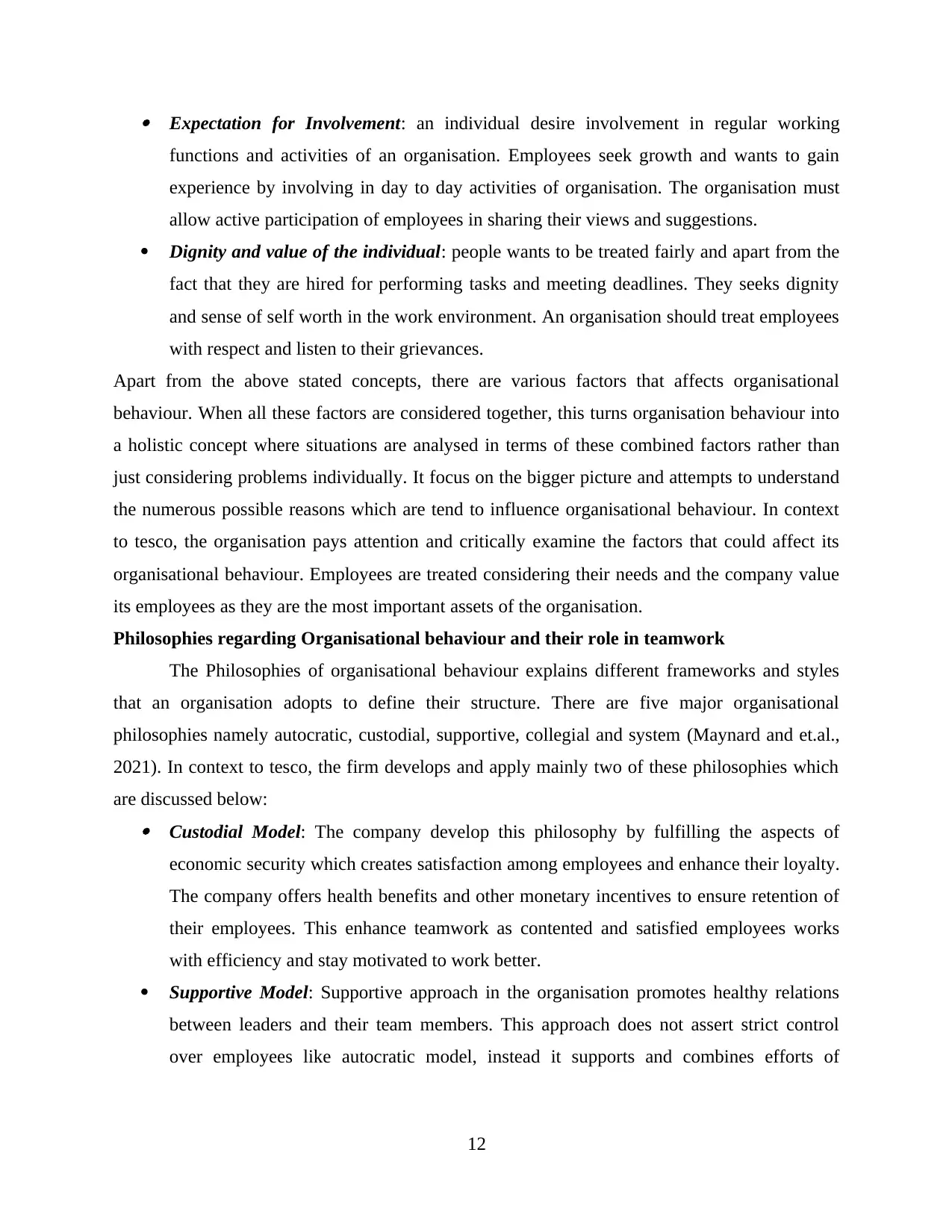
Expectation for Involvement: an individual desire involvement in regular working
functions and activities of an organisation. Employees seek growth and wants to gain
experience by involving in day to day activities of organisation. The organisation must
allow active participation of employees in sharing their views and suggestions.
Dignity and value of the individual: people wants to be treated fairly and apart from the
fact that they are hired for performing tasks and meeting deadlines. They seeks dignity
and sense of self worth in the work environment. An organisation should treat employees
with respect and listen to their grievances.
Apart from the above stated concepts, there are various factors that affects organisational
behaviour. When all these factors are considered together, this turns organisation behaviour into
a holistic concept where situations are analysed in terms of these combined factors rather than
just considering problems individually. It focus on the bigger picture and attempts to understand
the numerous possible reasons which are tend to influence organisational behaviour. In context
to tesco, the organisation pays attention and critically examine the factors that could affect its
organisational behaviour. Employees are treated considering their needs and the company value
its employees as they are the most important assets of the organisation.
Philosophies regarding Organisational behaviour and their role in teamwork
The Philosophies of organisational behaviour explains different frameworks and styles
that an organisation adopts to define their structure. There are five major organisational
philosophies namely autocratic, custodial, supportive, collegial and system (Maynard and et.al.,
2021). In context to tesco, the firm develops and apply mainly two of these philosophies which
are discussed below: Custodial Model: The company develop this philosophy by fulfilling the aspects of
economic security which creates satisfaction among employees and enhance their loyalty.
The company offers health benefits and other monetary incentives to ensure retention of
their employees. This enhance teamwork as contented and satisfied employees works
with efficiency and stay motivated to work better.
Supportive Model: Supportive approach in the organisation promotes healthy relations
between leaders and their team members. This approach does not assert strict control
over employees like autocratic model, instead it supports and combines efforts of
12
functions and activities of an organisation. Employees seek growth and wants to gain
experience by involving in day to day activities of organisation. The organisation must
allow active participation of employees in sharing their views and suggestions.
Dignity and value of the individual: people wants to be treated fairly and apart from the
fact that they are hired for performing tasks and meeting deadlines. They seeks dignity
and sense of self worth in the work environment. An organisation should treat employees
with respect and listen to their grievances.
Apart from the above stated concepts, there are various factors that affects organisational
behaviour. When all these factors are considered together, this turns organisation behaviour into
a holistic concept where situations are analysed in terms of these combined factors rather than
just considering problems individually. It focus on the bigger picture and attempts to understand
the numerous possible reasons which are tend to influence organisational behaviour. In context
to tesco, the organisation pays attention and critically examine the factors that could affect its
organisational behaviour. Employees are treated considering their needs and the company value
its employees as they are the most important assets of the organisation.
Philosophies regarding Organisational behaviour and their role in teamwork
The Philosophies of organisational behaviour explains different frameworks and styles
that an organisation adopts to define their structure. There are five major organisational
philosophies namely autocratic, custodial, supportive, collegial and system (Maynard and et.al.,
2021). In context to tesco, the firm develops and apply mainly two of these philosophies which
are discussed below: Custodial Model: The company develop this philosophy by fulfilling the aspects of
economic security which creates satisfaction among employees and enhance their loyalty.
The company offers health benefits and other monetary incentives to ensure retention of
their employees. This enhance teamwork as contented and satisfied employees works
with efficiency and stay motivated to work better.
Supportive Model: Supportive approach in the organisation promotes healthy relations
between leaders and their team members. This approach does not assert strict control
over employees like autocratic model, instead it supports and combines efforts of
12
⊘ This is a preview!⊘
Do you want full access?
Subscribe today to unlock all pages.

Trusted by 1+ million students worldwide
1 out of 15
Related Documents
Your All-in-One AI-Powered Toolkit for Academic Success.
+13062052269
info@desklib.com
Available 24*7 on WhatsApp / Email
![[object Object]](/_next/static/media/star-bottom.7253800d.svg)
Unlock your academic potential
Copyright © 2020–2025 A2Z Services. All Rights Reserved. Developed and managed by ZUCOL.




